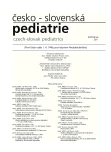-
Medical journals
- Career
The results of a five-year activity of Children Obesity Research Outpatient Department, Children Policlinic, Teaching Hospital Motol and 2nd Medical Faculty, Charles University, Prague
Authors: Z. Marinov 1; M. Nesrstová 1; U. Barčáková 1; P. Tláskal 1; J. Jůnová 2; B. Kalvachová 3; D. Zemková 3; J. Čepová 4; B. Tomášková 5
Authors‘ workplace: Obezitologická ambulance, Dětská poliklinika, FN Motol a UK 2. LF, Praha primář MUDr. P. Tláskal, CSc. 1; Klinika rehabilitace a tělovýchovného lékařství UK 2. LF a FN Motol, Praha přednosta doc. PaedDr. P. Kolář, CSc. 2; Pediatrická klinika UK 2. LF a FN Motol, Praha přednosta prof. MUDr. J. Lebl, CSc. 3; Ústav klinické biochemie a patobiochemie UK 2. LF a FN Motol, Praha přednosta prof. MUDr. R. . Průša, CSc. 4; Oddělení léčebné výživy FN Motol, Praha vrchní sestra M. Balíková 5
Published in: Čes-slov Pediat 2011; 66 (1): 6-11.
Category: Original Papers
Overview
The authors evaluated the data of 228 children (age 3.2 to 18 years) with overweight and obesity, who have been subject to complex examination and further followed in the obesity research outpatients’, Children Policlinic, Teaching Hospital Motol and 2nd Medical Faculty, Charles University, Prague. Based on a unified protocol and under a team collaboration the authors performed a cognitive-behavior therapy with the patient and the whole family. The psychosocial problems were evaluated as well as the general health state of the children in relation to the severity of obesity and the reached results in body mass reduction.
Only 29% of the observed children were in an agreeable state of mind, 32% of children expressed signs of ADHD syndrome and specific learning disorders, 29% of children displayed signs of uncertainty or even anxiety. Health complications occurred in 37.5% of children with first grade obesity, 47.2% of children had already the obesity associated with complex metabolic changes, which has to be treated. The evaluation of body mass reduction was assessed in connection with a natural decrease in the patients during the period of observation. In children observed for the period of two years it has become possible to decrease body may by -0.8 SD BMI on the average.
The results made it clear that prevention is the simplest and most efficient therapy of children obesity. However, it is necessary to evaluated the health risk of developing obesity in time together with the observation within the framework of the concept of children obesity research.Key words:
children with overweight and obesity, health complications, cognitive-behavioral therapy, children obesity prevention
Sources
1. Marinov Z. Rizika dětské obezity. Čes-slov Pediat 2009; 64(3): 141–146.
2. Pastucha D, Talafa V, Malincikova J, et al. Obesity, hypertension and insulin resistance in childhood – a pilot study. Biomed Pap Med Fac Univ Palacky Olomouc Czech Repub 2010; 154(1): 77–82.
3. Marinov Z. Léčba dětské obezity. Vox Pediatriae 2010; (5).
4.Pastucha D., Ripplová D, Vávrová P, et al. Management multioborové spolupráce při léčbě dětské obezity. PROFESE on-line 2010; 3(3): 175–184.
5. Pastucha D, Talafa V, Maliníková J. Porovnání rizikových faktorů ve skupině obézních dětí. Tělesná kultura 2010; 33(1): 100–110.
6. Marinov Z, Čepová J. Metabolické parametry pacientů dětské obezitologické ambulance. Čes-slov Pediat 2010; 65(2): 72–78.
7. Epstein LH, Paluch RA, Roemmich JN, Beecher MD. Famil-based obesity treatment, then and now: Twenty-five years of pediatric obesity treatment. Health Psychol 2007 July; 26(4): 381–391.
8. Whitlock EP, Williams SB, Smith PR, et al. Screening and interventions for childhood overweight. Pediatrics 2005; 116: e125–e144.
9. Pastucha D, Hyjánek J, Malinčíková J, et al. Obezita v dětském věku a inzulinová rezistence. Cent Eur J Publ Health 2007; 15(3): 103–105.
Labels
Neonatology Paediatrics General practitioner for children and adolescents
Article was published inCzech-Slovak Pediatrics

2011 Issue 1-
All articles in this issue
- Vaccination against pneumococcus in children in the Czech Republic in 2010–2011
- Screening the nutritional state upon admission of the child patient for hospitalization
- Prof. Jan Janda, M.D., Ph.D. – seventy years old young man
- The results of a five-year activity of Children Obesity Research Outpatient Department, Children Policlinic, Teaching Hospital Motol and 2nd Medical Faculty, Charles University, Prague
- The tast of the first cigarette: does it influence the progress of smoking behavior?
- Pediatric feeding disorders
- Autoimmune liver diseases in children. Part II
- Czech-Slovak Pediatrics
- Journal archive
- Current issue
- Online only
- About the journal
Most read in this issue- Pediatric feeding disorders
- Autoimmune liver diseases in children. Part II
- The tast of the first cigarette: does it influence the progress of smoking behavior?
- Prof. Jan Janda, M.D., Ph.D. – seventy years old young man
Login#ADS_BOTTOM_SCRIPTS#Forgotten passwordEnter the email address that you registered with. We will send you instructions on how to set a new password.
- Career

